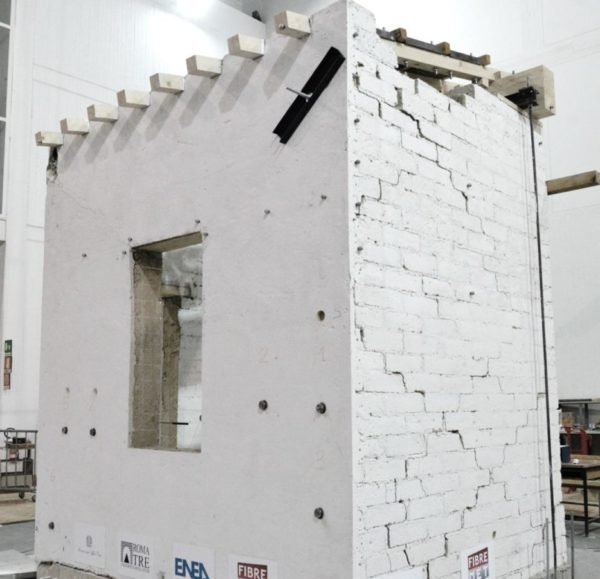Strengthening with advanced composites
Seismic retrofitting with Composite Reinforced Mortar
Description
Recent earthquakes have dramatically shown the seismic vulnerability of unreinforced masonry structures, which represent a significant proportion of the European built heritage. Despite the importance of minimizing the risks associated with earthquake induced damage on the building stock and the studies that have been carried out to date to tackle this challenging issue, a deep understanding of the seismic response of existing masonry structures still needs to be gained. Appropriate retrofitting technologies should also be developed to ensure an adequate protection of the life and health of people and to safeguard the built heritage in earthquake prone areas. Externally bonded composite materials appear particularly promising for seismic retrofitting of existing masonry constructions. Thanks to their high strength-to-weight ratio they can provide a significant enhancement of the seismic capacity (by contrasting the onset of collapse mechanisms) with minimum mass increase.
A shake table test was performed on a full-scale masonry specimen, made of three walls with openings and supporting an inclined timber roof. The specimen was tested unreinforced, then repaired and retrofitted with composite reinforced mortar (CRM) and tested again. The CRM system comprised a glass fibre reinforced polymer (GFRP) mesh applied with natural hydraulic lime mortar to the external surface of the walls. GFRP connectors were installed to improve the load transfer capacity from the reinforcement mesh to the masonry substrate. Thanks to the reduced thickness of the CRM overlay (3cm), the proposed retrofitting solution can be integrated with the ordinary maintenance works of the façades. Natural accelerograms, recorded during recent severe earthquakes in Italy were applied with increasing scale factor. The shake table test provided information on the seismic behaviour of masonry strutures as well as on the effect of the CRM reinforcement on seismic capacity, progressive damage, onset of collapse mechanisms, and dynamic properties.
This study is carried out within a Research Project funded by the Italian Ministry for Foreign Affairs “Composites with inorganic matrix for sustainable strengthening of architectural heritage”. Web page of the Project.
Links & Downloads
- Leaflet of the test session on the unreinforced structure
- Leaflet of the test session on the reinforced structure
- Piece on www.ingenio-web.it (25/01/2018)
- Piece on www.ingenio-web.it (01/02/2018)
- Piece by Ingenio on Youtube (05/02/2018)
Photo & Video Gallery
Shake Table Test on the Unreinforced Specimen – Test #11/11
- Seismic input: Umbria-Marche Earthquake, 26/09/1997
- Record Station: Nocera Umbra (NCR)
- Scale factor: 0.60
- Horizontal PGA: 0.409g
Shake Table Test on the Reinforced Specimen – Test #22/46
- Seismic input: L’Aquila Earthquake, 06/04/2009
- Record Station: L’Aquila (AQV)
- Scale factor: 1.00
- Horizontal PGA: 0.668g
Shake Table Test on the Reinforced Specimen – Test #46/46
- Seismic input: L’Aquila Earthquake, 06/04/2009
- Record Station: L’Aquila (AQV)
- Scale factor: 2.20
- Horizontal PGA: 1.645g
